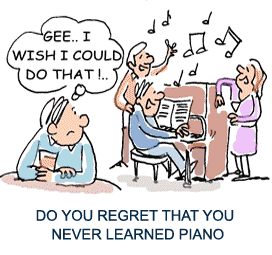
“More than art, more than literature, music is universally accessible”, to quote Billy Joel, and truly so.
Not only that music can be experienced very early in life, indeed, even before birth
Music is considered to be a sublime art form, which enthralls the listener. The gift of playing on an instrument is something that only a few people possess. Learn to play piano can be one of the most fulfilling activities you will ever be able to experience.
People often ask what is the best way to learn piano. Actually, there is no particularly best way that works for everyone. It depends on how you learn best, and your own personal preferences. Here are some important factors that are crucial in determining your learning success.
1. Learn to play piano with an experienced teacher
One of the best ways to learn to play piano is to learn from an experienced teacher. A good teacher can bring out the genius in you and so one of your first tasks in learning piano is to find a good teacher. We recommend learning from a teacher who has degrees in music education and whose teaching methods suit your personality best. The degrees will ensure that you’re being taught the basics, and the suitable teaching methods will increase your motivation and success.
A good teacher can teach beginners the important areas where they should focus while studying piano. She/he may recommend a different approach to learning and the things to keep in mind while playing the piano. Piano learning can become easier, if we seek the help of an experienced teacher.
Although you can learn from online self-instruction courses, but nothing is a real substitute for one-to-one interaction, and the motivation that this will generate (and prevention of unseen bad habits forming, as well as unawareness of errors).
2. Time and commitment
Some people are under the assumption that they can learn to play piano just by listening and by reading about it. While studying piano, one must have access to a piano (or a keyboard) and practice. To become a good piano player, you have to practice every day and make time for it. You have to practice continuously.
There is no shortcut!
There is no magic method!
How many hours a day should you practice? It depends on each individual but in general regular practices are more effective than long sporadic sessions. Keep practice sessions limited to a duration that allows you to stay focused. This may be as short as 10-20 minutes for younger students, and as long as 45-60 minutes for older individuals.
You should have a daily routine that involves both practicing technical exercises (i.e., scales, correct fingering, independency of hands) and learning the style of music you like.
Don’t be afraid to push boundaries and expand your playing styles and repertoire. In order to truly push your learning, you should make sure you are working outside of your musical comfort zone as often as possible. Even if you do not necessarily like the music you are listening to, you can always learn something new by paying attention to skilled and talented musicians from every genre.
3. Regular performance
The benefits of regular performances, even casual ones, are immeasurable. The most important benefit is that technique is never really acquired until it is demonstrated in a performance.
For young students, the benefits are even more fundamental. They learn what it means to complete a real task, and they learn what “making music” means. Piano students must learn them at their first recital, regardless of age. Students are never as self-motivated as when preparing for a recital. Nothing like an upcoming concert or recital (no matter how small) to get the blood racing and the practice back into gear.
Huntington Beach School of Music holding regular concerts/recitals knows those enormous benefits. Our students become focused, self-motivated, and results oriented. The students become serious about playing a piece correctly because it is their performance.
4. Sight reading
While some learn better by ear, it is important to learn to sight read. This will help you understand exactly what you do as you play. You will figure out the theory behind the music. Depending on how skilled you are, you can pick up a score and start to play. On the other hand, it’s sad that many players who can read music can’t listen to a song and play by ear. The ideal is to be able to do both, to sight read and play by ear as well.
5. Music theory / history
When you play an instrument, without music theory, you might not understand what’s going on. Exactly like when you’re admiring nature, and the thought of there being some complicated science behind a blooming flower never occurs to you.
Music theory will help you understand your instrument better. It will help you know the locations of all notes, scales, chords, etc. Plus, you will start to understand how all those scales, chords and arpeggios work together to create something very beautiful on your instrument, something that is called music.
Maintaining an active interest in music history will help you develop a deeper understanding of the music piece that you are playing: not just what to play and how to play it, but why it is or is not done that way, with respect to any style or genre from Baroque to Romantic.
6. Playing with a group
Learning to play in a chamber group has its advantages. You can learn a lot from playing in tune with your peers. Moreover it can be lots of fun to socialize with your peers as you learn to play together and make music.
Check out our piano program to start your musical journey.
